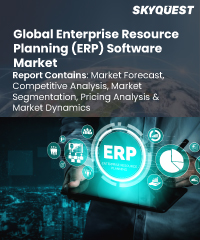
Report ID: SQMIG45F2120

Report ID:
SQMIG45F2120 |
Region:
Global |
Published Date: February, 2024
Pages:
165
|
Tables:
121 |
Figures:
77
Enterprise Resource Planning Software Market Driver
Businesses increasingly need to increase operational effectiveness and streamline business processes in order to spur growth.
Enterprise Resource Planning Software Market Restraint
High costs and a lack of skilled workers followed with limited integration challenges to limit the market growth.
Our industry expert will work with you to provide you with customized data in a short amount of time.
REQUEST FREE CUSTOMIZATIONEnterprise Resource Planning (ERP) Software Market size was valued at USD 45.82 billion in 2019 and is poised to grow from USD 49.28 billion in 2023 to USD 90.63 billion by 2031, growing at a CAGR of 9.1% in the forecast period (2024-2031).
Want to customize this report? This report can be personalized according to your needs. Our analysts and industry experts will work directly with you to understand your requirements and provide you with customized data in a short amount of time. We offer $1000 worth of FREE customization at the time of purchase.

Report ID: SQMIG45F2120